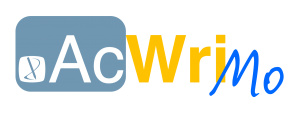 Remember AcBoWriMo, last year’s experiment in a month-long writing productivity drive? Well, it’s back, bigger and better than ever – but without the ‘Bo’!
Remember AcBoWriMo, last year’s experiment in a month-long writing productivity drive? Well, it’s back, bigger and better than ever – but without the ‘Bo’!
The idea hails from NaNoWriMo (National Novel Writing Month) an initiative designed to turn the whole of November into a month-long write-fest for current or would-be novelists. The idea is that you set yourself the task of writing 50 thousand words in November alone and bingo, you’ve got yourself a whole big chunk of novel! In 2011 I decided academics should give something similar a go and, I can happily report, it went brilliantly!
For AcBoWriMo, I invited people to join me in wearing comfy clothes, drinking a lot of coffee, napping at strange times and seeing how close we could each get to writing 50 thousand words. I admitted at the time that it was an insane target, but that it wasn’t the word count that was the point. Rather, it was a bid to gather people together for mutual support in the, at times, painfully difficult and soul-crushingly lonely task of academic writing. In the last year alone, I’ve watched with awe and excitement as so many academic communities have grown and expanded on social media platforms like Twitter (examples include #phdchat, #ecrbook, #digped, #fycchat with plenty more to be found here). Not to mention that our own AcBoWriMo off-shoot (and collaboration with Jeremy Segrott), the regular live Twitter chat on academic writing, #AcWri, has co-ordinated a huge amount of valuable discussion. Nice work Anna and Jeremy!
So I decided it was worth giving it all another go – with some revisions…
This year’s event will focus on ALL aspects of academic writing, and will encourage participants to set their own (wild) goals. As a result of that, and the strength of the AcWri community, it will be called AcWriMo. Just like Craig David, I copped some flack for the ‘Bo!’ part. Although I never intended to promote the idea that an entire academic book could be written in a month, by calling the event Academic Book Writing Month, it seems I over-emphasised that part. But we still want you to join in on setting yourself some unrealistic targets and fighting alongside us to achieve them.
So, here are the rules for #AcWriMo 2012
1. Set yourself some crazy goals. Try and come up with some outcomes that would really push you beyond anything you ever thought possible. I always said 50,000 words is a bit of a nutty goal for academic writing in one month (it works out at something like 2,500 words a day and that’s just bonkers) but if you’re bonkers, go ahead and set that target. Otherwise, think about how much you are comfortably able to write a day and set yourself the task of regularly exceeding that amount. If you can manage 300 words a day then we want 400, if you can do 1000, then we want 1500 – something like that. Last year, a lot of people preferred setting themselves a time-based goal. They would try to write for so many hours a day or week and often used the Pomodoro technique to count units of productive time. If that’s your thing, go for it! How about sneaking in an extra Pomodoro a day? Or, look at all the writing tasks you’ve got to achieve over the next few months and decide to get a set amount of them done in November. In the US it’s job season, so how about you count your job-letter-writing-time. Or article drafts maybe?
2. Publicly declare your participation and goals. You can do this by adding to the comments of this very blog post, by tweeting using the hashtag #AcWriMo, or by writing on our PhD2Published Facebook page. Being accountable is key to this working for you as a way to push yourself, but if you want to silently take part, at least tell a friend who is likely to hold you to it. [edit: you can now also add your goals to and keep track of your progress with Jenn’s AcWriMo Accountability Spreadsheet – thanks Jenn!]
3. Draft a strategy. This is essential if you’re going to make a success of this. Sitting down to write without preparation is the first step towards being struck down with writer’s block. We’ll be blogging and tweeting lots of ideas to help you, so before you start, work out a strategy for how you’ll tackle your set tasks. For example, establish how much you’ll need to write a day, and on which days you can definitely do this. Offload as much other work as you can, and get in some supplies (we recommend stocking up on decent coffee of course). Think about how you work best and adopt that approach from the start – this means planning everything from comfy clothes to reading sessions.
4. Discuss what you’re doing. OK so being on Twitter and Facebook with us all day isn’t acceptable – you’ve got work to do – but checking-in at certain times is imperative! We want to know how you’re getting on? What is working for you and what isn’t? We want you to tell us all if you need help with something but also to celebrate your successes with us too. And nothing is TMI when it’s AcWriMo because that’s the point: sharing!
5. Don’t slack off. As participant Bettina said of AcBoWriMo, you must ‘write like there’s no December!’ But guess what? If you work super hard now, there’s going to be more December to go round. Remember how December usually creeps up on you and suddenly its Christmas Eve and you’ve failed to buy gifts or take time out for yourself. Well, if you put the work in now, there’ll be so much December you won’t know what to do with it all!
6. Publicly declare your results – and please be honest! As a writing community, we’ll all benefit from sharing in your achievements, but it is also good to see what works and what doesn’t. And if you don’t make your targets, you’ll still be achieving the selfless goal of making the rest of us feel more normal – so it’s a community win/win really.
We’re raring to go, we hope you are too?! 🙂
 ost Pat Thomson will moderate a discussion on the challenges of setting and meeting academic writing goals. Everyone is welcome to join in with their questions and insights about productivity in academic writing. At this time of year, many writers are trying new approaches and making new resolutions; in this chat, we will consider why those resolutions are so hard to keep. Are we setting unrealistic goals? Are we saying “yes” to too many non-writing activities? Are we trying to find time to write without giving up anything else? Are we sticking with writing approaches that haven’t worked well for us in the past? Are we getting discouraged by the lack of immediate results? Are we assessing our own writing too harshly? One thing that we know often hampers attempts to develop new habits is trying to do it alone. While writing is often a solitary task, we can still gain solace from a community of other writers. The #acwri chats are a way of building that community and creating a space for writers to share their experiences with all facets of academic writing. Please join us on January 22 to be part of this valuable forum. In addition to questions and comments about goal setting, we welcome suggestions for topics for future chats.
ost Pat Thomson will moderate a discussion on the challenges of setting and meeting academic writing goals. Everyone is welcome to join in with their questions and insights about productivity in academic writing. At this time of year, many writers are trying new approaches and making new resolutions; in this chat, we will consider why those resolutions are so hard to keep. Are we setting unrealistic goals? Are we saying “yes” to too many non-writing activities? Are we trying to find time to write without giving up anything else? Are we sticking with writing approaches that haven’t worked well for us in the past? Are we getting discouraged by the lack of immediate results? Are we assessing our own writing too harshly? One thing that we know often hampers attempts to develop new habits is trying to do it alone. While writing is often a solitary task, we can still gain solace from a community of other writers. The #acwri chats are a way of building that community and creating a space for writers to share their experiences with all facets of academic writing. Please join us on January 22 to be part of this valuable forum. In addition to questions and comments about goal setting, we welcome suggestions for topics for future chats.










 Image from Mochimochiland.com
Image from Mochimochiland.com 



 Running the peer review gauntlet (from GenomicEnterprise.com)
Running the peer review gauntlet (from GenomicEnterprise.com) 
